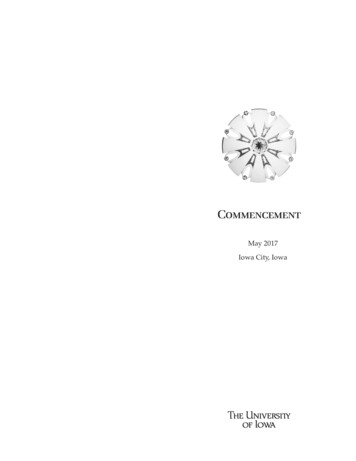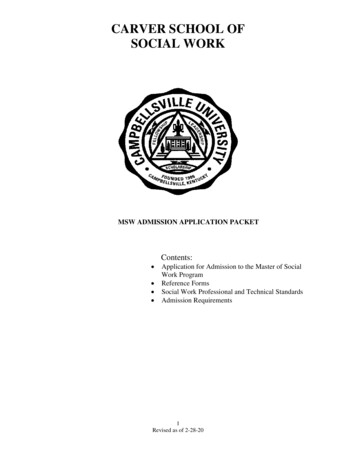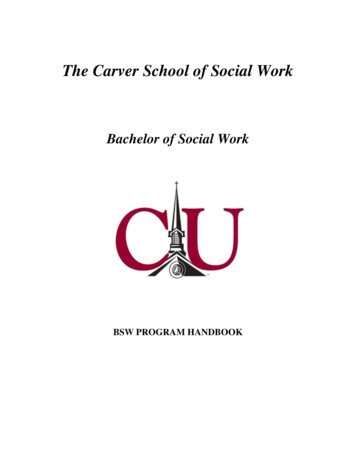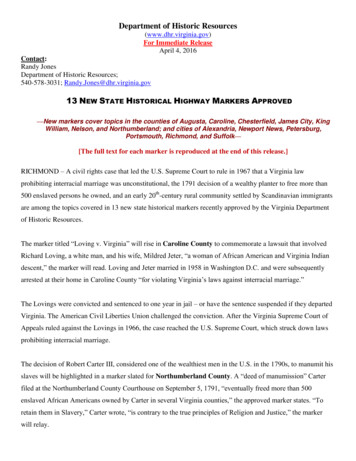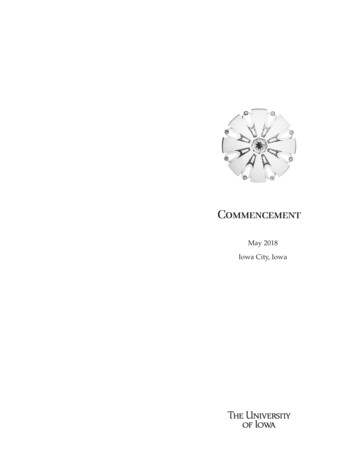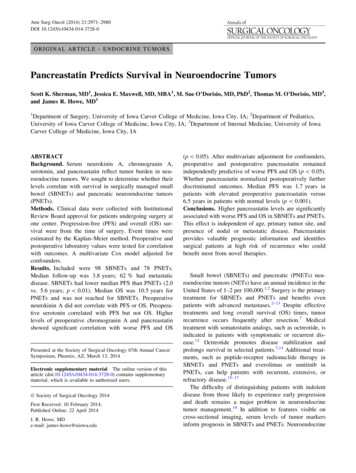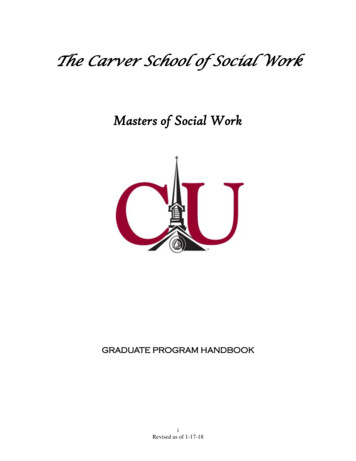
Transcription
The Carver School of Social WorkMasters of Social WorkGRADUATE PROGRAM HANDBOOKiRevised as of 1-17-18
TABLE OF CONTENTSINTRODUCTION.1HISTORICAL OVERVIEW .2Campbellsville University .2Master of Social Work Overview .5SOCIAL WORK PROGRAM GOALS AND COMPETENCIES .7Program Goals . . .7Foundation Competencies and Practice Behaviors .8Advanced Competencies and Practice Behaviors .10Program Outcomes Assessment .11Outcomes Administration Schedule .12Rating Scale for Evaluation of Field Placement Performance.12SWEAP Foundation Exam .12Advanced Competency Rubric .13State Licensure Examination .13Exit Survey.13Alumni Survey .14Leadership Positions/Employment .14MASTERS OF SOCIAL WORK CURRICULUM .14Program Content .14Course Sequence .15Foundation Curriculum .16Advanced Curriculum .18Course Descriptions .20ADMISSIONS REQUIREMENTS FOR THE MSW PROGRAM .27Admissions Notification .28Foundation and Advanced .28Student Advising. . .28Field Practicum Information .29Transfer Credit . . .29Life Experience Credit .30Orientation .30ACADEMIC POLICIES AND STANDARDS .31Terminating Student Enrollment .31Non-Academic Behavior .31Student Rights and Responsibilities.32Graduation Requirements .33Attendance in Face to Face Classes .33Attendance in Online Classes .34Student Email .34Academic Dishonesty .35Late Assignments and Exams .35Incomplete Grades .35Academic Grievance and Appeals .36Non-Academic Behavior Appeals .37iiRevised as of 1-17-18
STUDENT ORGANIZATIONS .37Phi Alpha Honor Society .37National Association of Social Workers (NASW) .37Social Work Club.38Advisory Board .38NON-DISCRIMINATION .38Campbellsville University Disability Statement .39SOCIAL WORK FACULTY AND STAFF .40APPENDIX A: Option 1 Curriculum Plan .41APPENDIX B: Option 2 Curriculum Plan .42APPENDIX C: Option 3 Curriculum Plan .44APPENDIX D: Option 4 Curriculum Plan .45APPENDIX E: Option 5 Curriculum Plan.47APPENDIX F: Option 6 Curriculum Plan .48APPENDIX G: Option 7 Curriculum Plan. .50APPENDIX H: Option 8 Curriculum Plan .51APPENDIX I: Option 9 Curriculum Plan .52APPENDIX J: Option 10 Curriculum Plan .53APPENDIX K: Option 11 Curriculum Plan .54APPENDIX L: Option 12 Curriculum Plan .55APPENDIX M: Option 13 Curriculum Plan .56APPENDIX N: Option 14 Curriculum Plan .57APPENDIX O: Option 15 Curriculum Plan .58APPENDIX P: MSW Admission Application Packet .59APPENDIX Q: Social Work Professional and Technical Standards.67APPENDIX R: Incomplete Grade Agreement .70iiiRevised as of 1-17-18
Masters Candidates and Students:Thank you for your interest into the MSW social work program atCampbellsville University! We are pleased and excited about your interest in socialwork as a profession and look forward to providing you with an advanced generalistsocial work master level education. The faculty of the Carver School of Social Workwelcomes you.In the Carver School of Social Work MSW program we view generalist socialwork education as a means to prepare graduates who can take the theoretical knowledgebase, interpret that base with assistance from instructors, critically analyze socialsystem and services needs on micro, mezzo and macro levels, and then implementassistance and services using an empowerment and social justice framework. In theadvanced standing program, we prepare graduates to become servant-leaders in thesocial work profession and seek positions and opportunities of leadership throughemployment and volunteer service. It is our sincere desire that this be your goal forseeking an MSW degree.You are receiving this handbook to help acquaint you with the program policies ofthe MSW program. It is important that you become familiar with this handbook, theUniversity catalog and the University student handbook.If you have any questions about your educational pursuit, the social work facultywill be pleased to assist you. We welcome your comments, ideas, and suggestionsregarding the social work program and this manual. We hope to make your experienceswith this program as educational and enjoyable as possible. God bless you and thankyou for your willingness to learn and serve.Sincerely,Helen Mudd, Ph.D., MSSW, CSWDean, Carver School of Social Work1Revised as of 1-17-18
Historical OverviewCampbellsville UniversityCampbellsville University is a comprehensive co-educational institution offeringcertificates, associate, bachelor and master’s degrees in a variety of subjects and disciplines. Theinstitution is committed to providing a quality educational experience within the Baptist traditionand in keeping with a strong Christian emphasis. Under the Lordship of Christ, the institutionaffirms historic Baptist principles including the priesthood of the believer, the authority ofScripture, freedom of conscience, integration of faith and learning, pursuit of truth in anacademically challenging environment, student involvement in servant ministry, and affirmationof others in a spirit of grace and love. While the University continues to maintain very close tiesto Baptist Churches and bodies, the institution exists to provide Christ-centered highereducational opportunities to a diverse student population.Campbellsville University, while Baptist in affiliation and Christ-based in practice, isneither a church nor an ecclesiastical authority. Since 1906, the institution has existed to providehigher educational opportunities to men and women in a positive and academically challengingChristian environment. In that same spirit, we affirm the challenges and opportunities of Baptisthigher education in the 21st Century.In compliance with A Statement on Baptist Higher Education Values as noted above,Campbellsville University affirms the historical religious exemption granted under the CivilRights Act of 1964, and other applicable federal and state statutes and regulations, as a Christianuniversity in the Baptist tradition, and to develop and implement all policies and proceduresrelative to employment practices and student and employee behavior to conform with thishistorical relationship to the Baptist church and the larger Christian community. These policies2Revised as of 1-17-18
and procedures will be the basis for the mission and activities of all campus organizations anduse of all Campbellsville University facilities.As God extended His love for all human beings through his Son Jesus Christ and as aninstitution that affirms the “whosoever will gospel of Jesus Christ” (John 3:16), CampbellsvilleUniversity extends love for mankind through a commitment to the Great Commission (Matthew28:16-20; Acts 1:8) and in the spirit of the Great Commandment (Matthew 22:36-40). Therefore,Campbellsville University will implement the development and administration of all policies andprocedures in the recognition of the diversity of God’s creation and His infinite grace toward allpeople.The University is located in south central Kentucky. The population of Campbellsville isestimated to be about 10,803 as of 2013 data. Campbellsville is the county seat of TaylorCounty, which has a population of approximately 24,649 as of 2013 data.Campbellsville University was founded in 1906 by the Russell Creek Baptist Associationas the Russell Creek Academy. The Academy grew and expanded with the improvements bothin curriculum and facilities. In 1924, the institution was renamed Campbellsville College and in1933 joined the Kentucky Association of Colleges and Secondary Schools. In 1949, the Collegewas accredited by the Southern Association of Secondary Schools and Colleges as a juniorcollege. In December 1963, the College received membership in the Southern Association ofColleges and Schools as an accredited liberal arts college. In 1996, Campbellsville Collegeadvanced to University status. The University currently awards a variety of associate,baccalaureate, and master’s degrees.The National Association of Schools of Music (NASM) accredits the CampbellsvilleUniversity Music program. The teacher preparation program is approved by the EducationProfessional Standards Board (EPSB) for teacher education and certification and is accredited by3Revised as of 1-17-18
the National Council for Accreditation for Teacher Education (NCATE). The NASDTECInterstate Contract provides opportunity for graduates to earn teaching certificates in other states,although there may be applicable conditions. The Baccalaureate Social Work and Masters ofSocial Work programs are accredited by the Council on Social Work Education (CSWE). TheMasters of Marriage and Family Therapy is accredited by the Commission on Academics forMarriage and Family Therapy Education (COAMFTE). The RN to BSN Nursing Program isaccredited by the Accrediting Commission for Education in Nursing (ACEN).The university is a member of the American Council on Education (ACE), theAssociation of Independent Kentucky Colleges and Universities (AIKCU), the Association ofSouthern Baptist Colleges and Schools (ASBCS), the Coalition for Christian Colleges andUniversities (CCCU), the Cooperative Services International Education Consortium (CSIEC),the Council for the Advancement for Small Colleges (CASC), the Kentucky IndependentCollege Fund (KICF), the National Association of Independent Colleges and Universities(NAICU), and the Council on Social Work Education (CSWE).Campbellsville University is continually developing programs to help meet the needs ofthe Central Kentucky community. Social work students contribute by organizing andparticipating in a variety of community service activities. The social work club works to servethe community by helping people and organizations fulfill unmet needs.Campbellsville University is noted for its community outreach with music, art, drama,and religious education. Drama, musical concerts and noted speakers are offered to thecommunity frequently at either minimal or no cost. The Campbellsville community andsurrounding counties have been very supportive of the university and its mission.The university is supported financially by tuition, fees, and donations. The alumni,faculty, and staff of the University are also faithful financial contributors to the institution.4Revised as of 1-17-18
Master of Social Work OverviewCampbellsville University established its first program of undergraduate social work in1974. The program was a Bachelor of Science degree offered with a social work major. Theprogram existed in that form until 1989 when it was phased out by the institution. In 1994, asocial work program was re-instituted due to many requests from the community and the desireof the Campbellsville University Board of Trustees. The university’s administration wasinsistent that if a program were reestablished it must meet national standards established by theCouncil of Social Work Education (CSWE). The Baccalaureate Social Work Program receivedofficial accreditation from CSWE in 2001 retroactive back to initial candidacy in 1998. TheBSW’s program’s initial reaccreditation was reaffirmed in 2005 and subsequently reaffirmed in2013. The degree conferred by Campbellsville University for persons successfully completingthe baccalaureate social work curriculum is a BSW.In 2008, the Carver School began a new MSW program by entering candidacy foraccreditation. The Council on Social Work Education awarded initial accreditation to CU in2012, retroactive to 2008. Accreditation was reaffirmed for the BSW in 2016 for another eightyears and the program will again seek reaffirmation in 2024.The Carver School MSW Program at Campbellsville University views social work as ahelping profession sanctioned by society to assist in the elimination of human suffering. Humansocieties are not perfect. Problems emerge that require solutions and human needs arise thatmust be met. Social work evolved from natural helping networks into a profession designed tosystematically address social problems and human needs. In order to achieve this purpose, theprofession takes two approaches: (1) To work to change social institutions, organizations andcommunities to better meet the needs of people and (2) To help people identify and utilize theirown strengths and to connect them with the resources which they lack. When resources are not5Revised as of 1-17-18
available, social workers advocate and work to establish programs to enhance the well-being ofhumans and alleviate the suffering brought about by various psycho-social-behavioral issues.Campbellsville University has a distinguished history with the Coalition of IndependentColleges and Schools, the Appalachian College Association and the Council for ChristianColleges and Universities. Through these relationships, the university provides studentsopportunities and benefits that differ from traditional state sponsored academic institutions. Withassistance and guidance from these affiliates, Campbellsville University offers residents of ruraland Christian communities an educational alternative to that of the large, secular, state sponsoreduniversity. Our commitment and uniqueness is in the Campbellsville University mission:Campbellsville University is a comprehensive, Christian institution that offerspre-professional, undergraduate and graduate programs. The university isdedicated to academic excellence solidly grounded in the liberal arts that fosterspersonal growth, integrity and professional preparation within a caringenvironment. The university prepares students as Christian servant leaders forlife-long learning, continued scholarship, and active participation in a diverse,global society.The Masters in Social Work’s mission statement complements the university mission statementin that:The mission of the Master of Social Work (M.S.W.) program is to expand career opportunitiesand prepare advanced generalist social service practitioners and/or administrators throughadvanced social work academic preparation in a Christ-centered environment. In the spirit ofChristian service, graduates apply advanced level professional social work skills in regional,national and/or international settings for the purposes of improving the quality of life.By providing an advanced level professional degree for social change agents and social leadersacademically prepared to improve society, the MSW program, with its mission to broaden careeropportunities for advanced level generalist to serve as leaders and administrators in an everchanging world, speaks to the core of the University and the Carver School of Social Workmission.6Revised as of 1-17-18
The MSW Program emphasizes the need for continuing education throughout life andencourages students to participate in continuing education opportunities. This can beaccomplished through graduate studies and/or attendance and participation in local, regional,state, and national meetings, conferences and workshops. The goal of the MSW program is toprepare graduates to work in a variety of settings with a variety of client types and systems.Models emphasizing the empowerment, social justice, Christ-centered service and strengthperspectives are infused throughout the educational experience. Using these models within aChristian/ social work value base, students will be prepared to provide assessment andintervention with individuals, families, groups, communities, and organizations in various formsof professional service.Social Work Program Goals and CompetenciesProgram GoalsGuided by the mission of this master’s program and influenced by the missions ofCampbellsville University, the social work profession and the needs of the local, regional, stateand international communities, the MSW program strives to attain the following goals:1. To prepare competent and effective advanced generalist level social workprofessionals to empower, lead and serve as practitioners, service coordinators,service administrators, policy analysts’ and program developers.2. To equip graduates with advanced generalist social work knowledge, values, andskills in preparation for service with diverse, at-risk, marginalized, oppressedpopulations which exist in rural, urban, national and international locations;3. To prepare advanced generalist social work practitioners that are skilled inevaluating and linking empirical knowledge, social work practice wisdom, socialresearch and practice outcomes;7Revised as of 1-17-18
4. To stimulate a desire within graduates for the pursuit of life-long-learning andChrist-centered service.These program goals build on a foundation of generalist content and expand toward thepreparation of advanced level social workers. As such, a foundation curriculum, similar to that ofthe undergraduate program, is provided in the first year of this master’s program; however, thefoundation graduate year incorporates graduate level rigor in research activities and learningassignments, as well as assessment tools used to evaluate the acquisition of knowledge and skillsthat require the demonstration of knowledge and skills befitting a graduate student.The MSW Foundation program competencies and practice behaviors gained in the first30 hours of the MSW are as follows:Foundation Competencies and Practice Behaviors1. Demonstrate Ethical and Professional Behavior1.1 Make ethical decisions by applying the standards of the NASW Code of Ethics,relevant laws and regulations, models for ethical decision-making, ethical conduct ofresearch, and additional codes of ethics as appropriate to context;1.2 Use reflection and self-regulation to manage personal values and maintainprofessionalism in practice situations;1.3 Demonstrate professional demeanor in behavior, appearance; and oral, written, andelectronic communication;1.4 Use technology ethically and appropriately to facilitate practice outcomes; and1.5 Use Supervision and consultation to guide professional judgment and behavior.2. Engage Diversity and Difference in Practice2.1 Apply and communicate understanding of the importance of diversity and differencein shaping life experiences in practice at the micro, mezzo, and macro levels;2.2 Present themselves as learners and engage clients and constituencies as experts oftheir own experiences, and2.3 Apply self-awareness and self-regulations to manage the influence of personal biasesand values in working with diverse clients and constituencies.3. Advance Human Rights and Social, Economic, and Environmental Justice3.1 Apply their understanding of social, economic, and environmental justice to advocatefor human rights at the individual and system levels; and3.2 Engage in practices that advance social, economic, and environmental justice.4. Engage in Practice-Informed Research and Research-Informed practice.4.1 Use practice experience and theory to inform scientific inquiry and research;8Revised as of 1-17-18
4.2 Apply critical thinking to engage in analysis of quantitative and qualitative researchmethods and research findings; and4.3 Use and translate research evidence to inform and improve practice, policy, andservice delivery.5. Engage in Policy Practice5.1 Identify social policy at the local, state, and federal level that impacts well-being,service delivery, and access to social services;5.2 Assess how social welfare and economic policies impact the delivery of and access tosocial services;5.3 Apply critical thinking to analyze, formulate, and advocate for policies that advancehuman rights and social, economic, and environmental justice.6. Engage with Individuals, Families, Groups, Organizations, and Communities6.1 Apply knowledge of human behavior and the social environment, person-inenvironment, and other multidisciplinary frameworks to engage with clients andconstituencies; and6.2 Use empathy, reflection, and interpersonal skills to effectively engage diverse clientsand constituencies.7. Assess Individuals, Families, Groups, Organizations, and Communities7.1 Collect and organize data, and apply critical thinking to interpret information fromclients and constituencies;7.2 Apply knowledge of human behavior and the social environment, person-inenvironment, and other multidisciplinary theoretical frameworks in the analysis ofassessment data from clients and constituencies;7.3 Develop mutually agreed-on intervention goals and objectives based on the criticalassessment of strengths, needs, and challenges within clients and constituencies; and7.4 Select appropriate intervention strategies based on the assessment, researchknowledge, and values and preferences of clients and constituencies.8. Intervene with Individuals, Families, Groups, Organizations, and Communities8.1 Critically choose and implement interventions to achieve practice goals and enhancecapacities of clients and constituencies;8.2 Apply knowledge of human behavior and the social environment, person-inenvironment, and other multidisciplinary theoretical frameworks in interventions withclients and constituencies;8.3 Use inter-professional collaboration as appropriate to achieve beneficial practiceoutcomes;8.4 Negotiate, mediate, and advocate with and on behalf of diverse clients andconstituencies;8.5 Facilitate effective transitions and endings that advance mutually agreed-on goals.9. Evaluate Practice with Individuals, Families, Groups, Organizations, andCommunities9.1 Select and use appropriate methods for evaluation of outcomes;9Revised as of 1-17-18
9.2 Apply knowledge of human behavior and the social environment, person-inenvironment, and other multidisciplinary theoretical frameworks in the evaluation ofoutcomes;9.3 Critically analyze, monitor, and evaluate intervention and program processes andoutcomes; and9.4 Apply evaluation findings to improve practice effectiveness at the micro, mezzo, andmacro levels.The Advanced MSW program (year) builds on the foundation and includes the followingcompetencies and practice behaviors:Advanced Competencies and Practice Behaviors1. Demonstrate Ethical and Professional BehaviorA1.1 Engage with clients and colleagues conveying a strength-based demeanor andattitude.A1.2 Demonstrate professional and ethical social work conduct in all levels of practice.A1.3 Demonstrate the ability to critically analyze cases and articulate how to manageethical issues in practice scenarios.A1.4 Demonstrate the ability to apply social work ethics and values to the evaluation ofsocial intervention.2. Engage Diversity and Difference in PracticeA2.1 Demonstrate culturally centered practice that recognizes the diversity that existsbetween, among, and within different groups.A2.2 Apply self- awareness to manage the influence of personal biases and values inworking with diverse individuals, families, groups, organizations, communities andconstituencies.3. Advance Human Rights and Social, Economic, and Environmental JusticeA3.1 Demonstrate effective and diplomatic skills in advocacy.A3.2 Deconstruct situations (culture, social, political, economic, etc.) where human rightsare being violated.A3.3 Compare how social, economic, cultural, and political frameworks can oppress andviolate human rights.4. Engage in Practice-Informed Research and Research-Informed PracticeA4.1 Appraise, evaluate, and propose various methods of program evaluation.A4.2 Collect and organize data, and apply critical thinking to interpret information fromindividuals, families, groups, organizations, communities, and constituencies.A4.3 Evaluate how personal values and biases impact research-informed practice andpractice-informed research.5. Engage in Policy PracticeA5.1 Demonstrate leadership in the organizational change process.A5.2 Evaluate the impact (intended and unintended) of global polices and regulations.10Revised as of 1-17-18
A5.3 Interpret societal trends in order to develop and promote the empowerment ofvulnerable populations within social work practice.6. Engage with Individuals, Families, Groups, Organizations, and CommunitiesA6.1 Establish a relationally based process that encourages Individuals, Families,Groups, Organizations, and Communities to be equal participants in theestablishment of expected outcomes.A6.2 Implement appropriate engagement strategies to engage individuals, families,groups, organizations, and communities within a particular theoretical model.A6.3 Utilize self-reflective and intrapersonal skills to effectively engage diverseindividuals, families, groups, organizations, communities, and constituencies.7. Assess Individuals, Families, Groups, Organizations, and CommunitiesA7.1 Articulates and demonstrates the influence theory has on assessment process.A7.2 Apply an assessment strategy to assess individuals, families, groups, organizations,and communities within a complimentary theoretical model.A7.3 Design appropriate assessment and planning strategies that empower servicerecipients.8. Intervene with Individuals, Families, Groups, Organizations, and CommunitiesA8.1 Utilize leadership skills to promote sustainable change in the intervention process.A8.2 Implement effective intervention strategies to work with individuals, families,groups, organizations, and communities within a particular theoretical model.A8.3 Implement the strategies that empower individuals, families, groups, organization
social work master level education. The faculty of the Carver School of Social Work welcomes you. In the Carver School of Social Work MSW program we view generalist social work education as a means to prepare graduates who can take the theoretical knowledge base, interpret that base with assistance from instructors, critically analyze social


